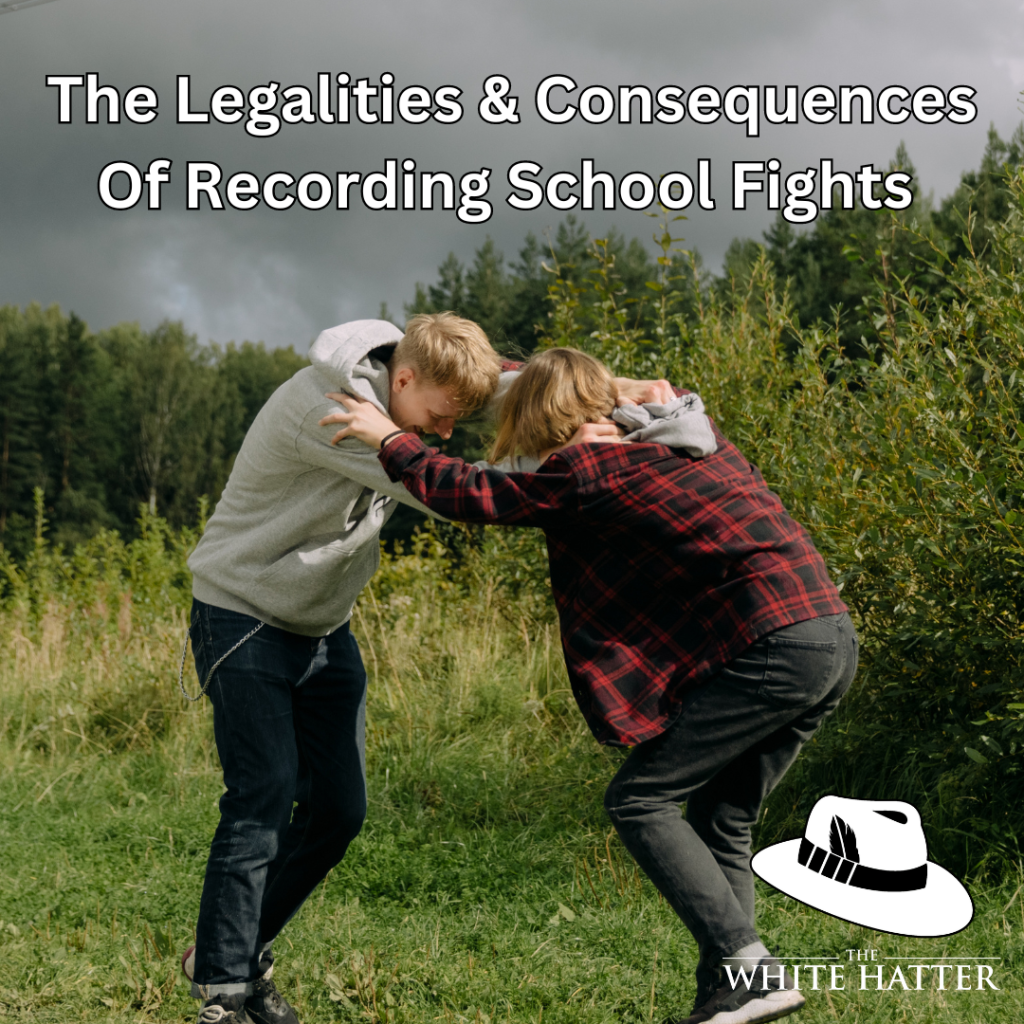Teens, Technology, & Digital Dilemmas: There Can Be Serious Consequences For Recording and Sharing School Fights Online!
- The White Hatter

- Oct 4, 2024
- 4 min read
Updated: May 8, 2025

Caveat – The legal consequences discussed in this article are based on Canadian law. However, the other consequences mentioned in this article may be relevant to other countries worldwide.
In recent weeks, two alarming incidents in British Columbia have involved teens being lured into situations where they were swarmed and seriously assaulted - one incident occurring on school property, and the other off school grounds. What makes these events even more troubling is that bystanders, and even some of the teens responsible for the attacks, recorded the assaults and spread the footage on social media.
These violent incidents raise significant concerns about the responsibilities of everyone involved - not only those committing the assaults, but also those recording and sharing these fights online. The act of recording a violent incident as a bystander, even if the situation involves a crime, isn’t necessarily illegal in Canada. However, this doesn’t mean there aren’t serious consequences for recording or distributing such footage. In some cases, it could lead to charges specific to cyberbullying or other civil actions, where the video is weaponized and used as a digital trophy to harass, shame, or embarrass the individuals involved. It's also worth noting that sharing violent content, especially involving minors, can violate social media platform guidelines, which may result in a teen’s account being suspended or banned.
For parents and teens, here are some other important considerations:
Your Phone Could Be Seized As Evidence:
When the police investigate assaults like these, the footage recorded on a teen’s phone may become part of the evidence. The process, known as a "data dump," allows authorities to seize electronic devices and collect all data via warrant, which could take weeks or even months for the phone to be returned to its owner once seized. During this time, everything on your teen’s device - texts, emails, photos, and personal content could be reviewed by investigators.
Even if the teen didn’t intend to share the footage widely, they may still be subpoenaed as a witness, which means they would be legally required to testify in court about what they recorded, regardless of their willingness to do so.
Be Careful What You Say:
In addition to criminal legal concerns surrounding the recording itself, be mindful of what you say during or after the incident. If a teen makes false and damaging comments about another person, either in the recording or in discussions surrounding the incident, they could face a defamation lawsuit. Comments that are slanderous (spoken) or libelous (written) can lead to civil liability, meaning a teen or their family could be sued - even if they were just repeating something someone else said.
School Consequences:
If the incident occurs on school property, or off school property during a school sponsored event, filming and distributing the footage can lead to disciplinary actions under the school’s code of conduct. Schools take these incidents seriously, and even if a teen wasn’t directly involved in the fight, recording and not turning the footage over to the school administration could result in suspension or other disciplinary measures. However, handing over the video to school officials as evidence will often help a teen avoid these consequences.
Long-Term Impact:
Remember, everything a teen post or participates in online becomes part of their digital dossier - a digital trail that follows them throughout life. It's crucial for teens to understand that their online activities can sometimes be accessed by future scholarship committees, grant boards, or potential employers, who now often look beyond academic achievements to assess character and judgment. The decisions teens make today, especially regarding what they post or share, can impact their future opportunities, as even one shared video could raise questions about their decision-making in the eyes of those responsible for their future.
Sharing Footage Online In Violation Of Terms Of Service (TOS)
Sharing the video online could have long-term consequences, even if it’s not illegal. In some cases, it could lead to charges surrounding cyberbullying or other civil actions, especially if the video is used to harass or embarrass the individuals involved. It's also worth noting that sharing violent content, especially involving minors, can violate social media platform guidelines, which may result in a teen’s account being suspended or banned.
Parental Involvement and Consequences at Home:
When a teen posts a school fight on social media, parents or guardians are often notified by the school, police, or other concerned parties. This can lead to serious consequences at home, depending on the family’s approach to discipline and digital behavior. Parents may take actions such as restricting or banning their teen from using smartphones, social media, or other digital devices. This could be temporary or long-term, depending on the severity of the situation and how the teen responds to the consequences.
In today's hyper-connected onlife world, recording a violent incident may seem like a passive or harmless act, but it can carry significant consequences that go beyond the immediate moment. Although filming a fight is not illegal in Canada, the aftermath can involve legal scrutiny, defamation risks, school disciplinary actions, and the long-lasting effects of one's digital dosier.
For teens, it's critical to understand the gravity of capturing and sharing violent content. A moment of recording or posting online can lead to a digital dossier that follows them into adulthood, potentially affecting academic and career opportunities. For parents, this serves as a reminder to guide their children through the ethical and legal complexities of the digital landscape.
By making informed decisions now, teens can steer clear of serious consequences in the future, safeguarding their opportunities and ensuring they handle the digital challenges they will inevitably encounter responsibly.
Remember:
Filming a fight is not illegal in Canada, but there could be other consequences, both legal and ethical, to consider.
Footage can be seized by the police for evidence, and a teen may be called to testify.
Sharing or making defamatory comments during or after recording could lead to civil legal actions.
School disciplinary rules and social media guidelines may also come into play when recording a fight.
Posting a video of a fight may lead to a teen's social media account being deleted, and they could be permanently banned from the platform.
Digital Food For Thought
The White Hatter
Facts Not Fear, Facts Not Emotions, Enlighten Not Frighten, Know Tech Not No Tech














